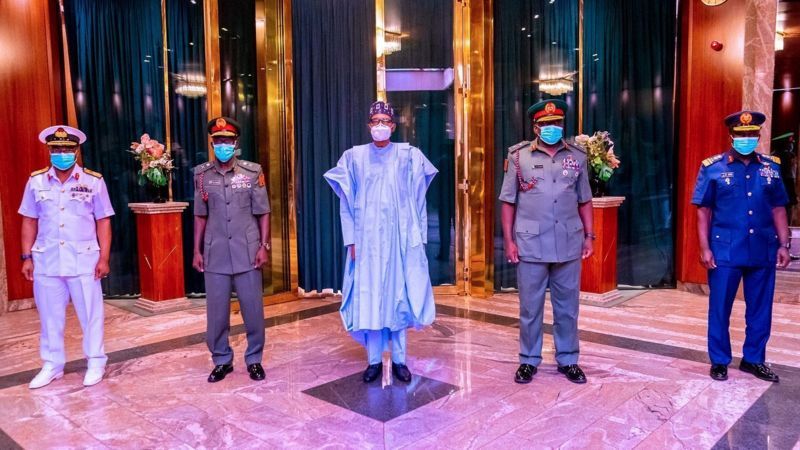President Muhammadu Buhari had recently appointed new service chiefs as the tenure of the former service chiefs expired.
He appointed Maj Gen Lucky Irabor, Chief of Defense Staff, Maj Gen I Attahiru, Chief of Army Staff, Rear Admiral AZ Gambo, Chief of Navy Staff, and Air Vice Marshal I.O. Amao, Chief of Air Staff.
Observers believe with the new service chiefs appointments, there is urgent need for maximum cooperation from traditional and religion leaders to ordinary citizens, especially in the country’s crisis spots to ensure that insecurity becomes a thing of the past.
Civil-military relations must be deepened by the new service chiefs in all areas of operations. Programmes like medical outreaches should be organised to improve the standard of living in those communities to make them more welcoming to the military.
The focus, this era, should not be just on the military activities if the country wants to decisively bring this problem to an end. There should be special programmes to create intimacy with village heads and grassroots opinion leaders in the North-east and other crisis spots, so that very vital sources of information on the identity and location of the criminals can be cultivated and retained. This can help reduce any tensed atmosphere between herdsmen and communities within the theaters of military operation.
Another area the new service chiefs are expected to improve things is the dynamism in strategy and operation. The tactics terrorists deploy to cause mayhem is constantly changing and unpredictable. That of the military must never be static. Considering the changes in the contemporary battlefield, there is no doubt that the need to move strategies and policies to another level is best during a transitional time like this.
Each arm of the military now should intensify their capability to conduct independent operations across the three spectrums of combat operations, land, sea and air. They need to build on it as their predecessors had started work in this area. This is in line with international best practices as seen in armies of other countries.
To achieve success in their campaigns, the new service chiefs must equally avoid nepotism and appoint only good and efficient commanders under them. Non-performance must never be tolerated. This is the only way they can create strong institutions and systems that would stand the test of time.
The new service chiefs are also expected to set up a time frame for themselves which they will use to flush out bandits and criminals- Boko Haram, cultism, kidnapping, armed robbery among others. Even if it is an internal target, it will help create a sense of urgency within the team and propel everyone to push for an end to this seemingly endless campaign against insurgency.
Another task ahead of the new service chiefs is that of boosting the confidence of the rank and file within the military formations. News of soldiers resigning or running away from the battle front should not exist in the current team. Medical and welfare must remain a priority, while salaries and allowances must never be delayed.
The new service chiefs must set up a strong machinery to consistently strengthen military command and control centre against external attacks by terrorists to preserve military equipment. They must also coordinate operational activities and provide guidance for self-defense for the armed forces. The era of Boko Haram overrunning or taking over military camps should not be allowed to occur in the new dispensation.
Modern wars are not fought in ancient ways. Therefore, a good communication system for effectiveness and operational efficiency of military offensive is required. The formation must constantly obtain local and global report, analyze them for efficient prosecution of counter-terrorist operation. Information flow and exchange within the nation’s security architecture must be done on a regular basis. The era of one team trying to outshine the other, to take the glory in victories must not exist anymore. Pushing for a truly united armed forces must be paramount in the minds of all the new service chiefs.
To prevent illegal entry and exit from the country by criminals and insurgents, the borders must be properly controlled in collaboration with the para-military units from federal ministry of internal affairs responsible for this. The country must not encourage continuous infiltration of mercenaries from north Africa.
Collaboration with neighbouring countries which was quite visible during the era of the immediate past service chiefs should be in sustained. This will facilitate more effective counter terrorists operations, exchange of information and execution of joint activities.
The military must pay considerable attention to enhancing the capabilities of constant readiness and prompt response to criminal attacks. Areas that are prone to criminal activities should be documented and analysed in light of possible risks.
To guarantee total victory over banditry and Boko Haram, aerial bombardments that began a few years ago should be intensified, to spot and destroy enemy targets/locations in order to degrade the threat of insurgency completely.
Units responsible for surgical counter terrorists’ activities must be retrained in all relevant fields, considering the level of risk involved in entering enemy locations with limited back up.
The new service chiefs must also make sure they operate according to the Geneva convention guidelines on Human Rights, in order to avoid regular negative reports from nosy organizations waiting to scream about any semblance or form of violation of fundamental human rights in any area of military operation.









